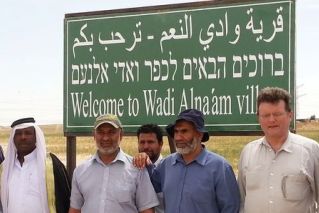 צילום: הוועד המקומי ואדי אל-נעם
צילום: הוועד המקומי ואדי אל-נעםOn 25.07.2016 the Housing Cabinet approved a resolution proposing to establish a new community for the residents of Wadi al-Na’am, and to move all of the residents to an area south and adjacent to Segev Shalom. ACRI and Bimkom – Planners for Planning Rights have appealed to the Housing Cabinet to hold another hearing on the decision, which is not accepted by the village residents.
Wadi al-Na’am, the largest unrecognized Bedouin village, was established in the 1950s when Bedouin residents of the Negev were moved there under martial law. Since then the community has been deemed “temporary” and has not been connected to water, electricity, sewage, telephone or roads. Residents suffer from a severe lack of education, healthcare and welfare services.
The only solution that the authorities have offered is urbanization, i.e. moving the residents to the town of Segev Shalom. The residents of Wadi al-Na’am have continually objected to this, as their main interest is to preserve their agricultural way of life.
In 2014 ACRI submitted a petition to the High Court of Justice, along with Bimkom – Planners for Planning Rights and residents of the village – against the plan to forcibly transfer the approximately 10,000 residents of Wadi al-Na’am to an area near the crowded township of Segev Shalom. Following a hearing in April 2015, the Court invited the residents to submit alternatives to the location. ACRI subsequently submitted two alternative plans on behalf of the community (both consistent with the Be’er Sheva Metropolitan Area Plan). The options involved either a consortium of three rural settlements, or maintaining the current location while placing restrictions upon the reach of the Ramat Hovav industrial area.
However, the government continues to act in bad faith and has now decided to promote a decision that offers the same solution that the residents have petitioned against in the past.
According to the Cabinet decision, the new settlement will be connected to the municipality of Segev Shalom and reliant on Segev Shalom for infrastructure, with minimal space for development. All of this strongly suggests that the government’s actual plan is to make Wadi al-Na’am a neighborhood within Segev Shalom. The new town is suburban and not rural – and will therefore fail to meet the needs and lifestyle of the residents of Wadi al-Na’am.
The decision was not made with the agreement of the village residents. In fact it was promoted without their knowledge or involvement. The minister and the new head of the Authority for the Advancement of Bedouin settlements in the Negev have not met with the residents, even though the Wadi al-Na’am is the largest community in the Negev and is subject to the most dramatic planning process.
A solution that is not agreed upon, is not a feasible solution. No one imagined a situation whereby ten thousand citizens, including children and the elderly, would be forcibly removed to a small area. This is not an adequate or proper response to the distress that the community has experienced for many years. The residents have already expressed their willingness to compromise to find a solution, which would require many of them to leave their homes as they are close to Ramat Hovav. Every effort must be made to reach a negotiated solution; as imposing a forced solution would infringe upon the right to recognition and the right to preserve the residents’ lifestyle.
ACRI will continue to advocate on behalf of the residents of Wadi al-Na’am and the unrecognized villages, to defend their basic rights to recognition and planning, and to advocate for fair and proper solutions to end their ongoing suffering.







